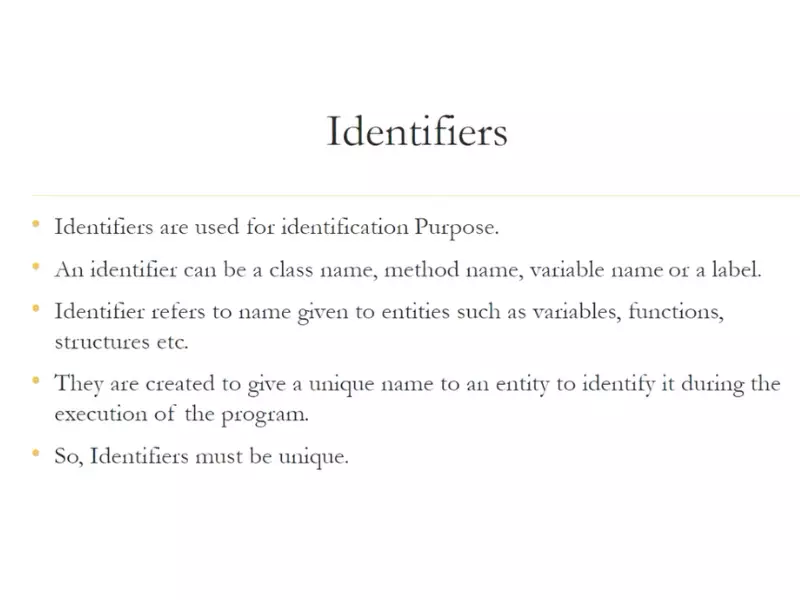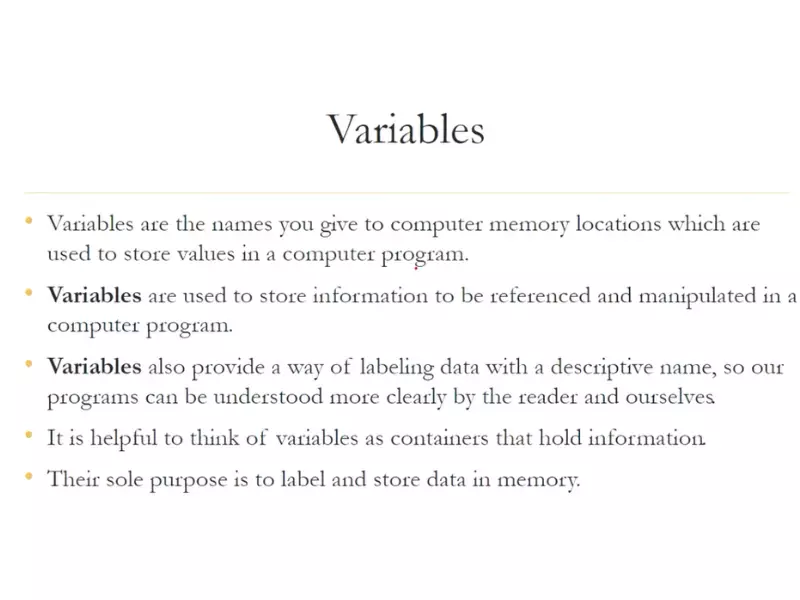In the realm of programming, the terms “identifier” and “variable” are foundational yet often conflated. These elements are the building blocks of code, enabling programmers to define, store, and manipulate data within software applications. Despite their frequent use in tandem, identifiers and variables serve distinct roles within the programming lexicon, each with its unique set of rules and functions.
An identifier is a name assigned to an element in a program, such as a variable, function, or class, to facilitate identification and reference. Variables, on the other hand, are containers for storing data values that can change during the execution of a program. While an identifier can refer to a variable, it can also refer to other entities in a program, making the relationship between these two concepts a fundamental aspect of coding.
Understanding the difference between identifiers and variables is crucial for effective programming. Identifiers serve as the names that allow programmers to refer to variables, functions, and other entities, while variables are the means by which data is stored and manipulated. This distinction is not merely semantic; it influences how programs are written, understood, and executed, impacting everything from variable naming conventions to data manipulation and storage.

Identifiers Explained
Definition
In programming languages, an identifier is a name that is given to entities such as variables, functions, classes, and constants. These names are used by programmers to access or refer to these entities throughout their code. Identifiers are fundamental to the creation and management of readable, maintainable code. They serve as the link between the code and its functionality, allowing developers to manipulate data, execute functions, and structure their programs efficiently.
Characteristics
Naming Conventions
Identifiers follow specific naming conventions that vary across different programming languages. These conventions often dictate that identifiers:
- Start with a letter (a-z, A-Z) or an underscore (_)
- Can include letters, digits (0-9), and underscores
- Are case-sensitive, where
VariableNameandvariablenameare considered different
Scope
The scope of an identifier refers to the part of the code where the identifier is recognized and can be used to refer to the associated entity. The two main types of scope are:
- Local Scope: The identifier is only recognized within a limited part of the program, such as inside a function.
- Global Scope: The identifier is recognized throughout the entire program.
Types
Identifiers can be associated with various types of entities in a program, including:
- Variables: Names given to storage locations that hold data values.
- Constants: Names given to values that cannot be changed during the execution of the program.
- Functions: Names given to blocks of code designed to perform specific tasks.
- Classes: Names given to blueprints for creating objects (in object-oriented programming).
Variables Explained
Definition
A variable is a container for storing data values. In programming, variables are used to hold information that can be manipulated and retrieved throughout the execution of a program. Each variable is associated with a data type, which dictates the kind of data the variable can hold, such as integers, strings, or boolean values.
Characteristics
Mutability
Mutability refers to the ability of a variable’s value to be changed after it has been initialized. Variables are mutable, meaning their values can be updated based on the program’s logic.
Scope
Similar to identifiers, variables have a scope which determines where the variable can be accessed or modified within the program. This can be either local or global.
Lifetime
The lifetime of a variable refers to the duration for which the variable exists in memory during the program’s execution. The lifetime can vary based on the variable’s scope and the programming language’s memory management rules.
Types
Variables can be categorized based on their data type and scope:
- Based on Data Type: Integer, String, Boolean, etc.
- Based on Scope: Local variables (accessible only within a specific block) and global variables (accessible throughout the entire program).
Core Differences
Naming Conventions
While both identifiers and variables follow naming conventions, the conventions for variables are often more strictly defined, especially regarding the use of certain keywords and symbols. Identifiers might have a broader range of acceptable names, especially when they represent entities other than variables.
Role and Function
The role of an identifier is to provide a unique name to various entities within a program, facilitating easy reference and manipulation. A variable, on the other hand, specifically serves as a storage location for data values. The function of a variable is to hold and allow manipulation of data, whereas an identifier’s primary function is naming.
Scope and Lifetime
The scope and lifetime differences between identifiers and variables are nuanced. While the scope of an identifier depends on the entity it names, a variable’s scope is more directly related to its data storage and accessibility. Variables have a defined lifetime, which starts when they are declared and ends when they go out of scope or the program terminates. Identifiers, however, might persist differently based on the programming language’s rules and the type of entity they are associated with.

Practical Applications
In Programming Languages
Identifiers and variables are the linchpins of programming languages, each serving a pivotal role in the structure and operation of code. Their application varies across languages, reflecting diverse syntax rules and programming paradigms.
Python
In Python, a dynamically typed language, variables do not require explicit declaration to reserve memory space. The declaration happens automatically when a value is assigned to a variable. Identifiers in Python can include letters, numbers, and underscores, but cannot start with a number.
pythonCopy code
employee_name = "John Doe" # 'employee_name' is an identifier naming a string variable. age = 30 # 'age' is an identifier for an integer variable.
Java
Java, a statically typed language, requires explicit variable type declarations. Identifiers in Java follow similar rules to Python but are used within a stricter type system.
javaCopy code
String employeeName = "John Doe"; // 'employeeName' is an identifier for a String variable. int age = 30; // 'age' is an identifier for an integer variable.
JavaScript
JavaScript, known for its use in web development, allows for flexible variable declarations with var, let, and const, showcasing different scopes and mutabilities. Identifiers adhere to the general naming conventions but are used in a context that often involves manipulating web page elements.
javascriptCopy code
let employeeName = "John Doe"; // 'employeeName' is an identifier. const age = 30; // 'age' is an identifier for a constant variable.
In Software Development
In software development, identifiers and variables facilitate the creation of complex applications, ranging from web development to machine learning models. Their application can be seen in database management, algorithm implementation, and user interface creation.
Database Management
In a database application, identifiers name tables, columns, and schemas, which are then manipulated using variables in SQL queries or database scripts. This allows for dynamic data management and retrieval.
sqlCopy code
SELECT employee_name FROM employees WHERE age > 30; -- 'employee_name' and 'age' are identifiers for columns in the 'employees' table.
Algorithm Implementation
In algorithm design, variables store data such as loop counters and temporary values for calculations, while identifiers name functions and data structures, aiding in code readability and logic implementation.
pythonCopy code
def calculate_factorial(number): # 'calculate_factorial' and 'number' are identifiers. factorial = 1 # 'factorial' is a variable. for i in range(1, number + 1): factorial *= i return factorial
User Interface Development
In user interface (UI) development, identifiers name elements like buttons, text fields, and images. Variables store values like user input, facilitating interactive and dynamic web pages.
htmlCopy code
<button id="submitBtn">Submit</button>
javascriptCopy code
let userName = document.getElementById('username').value; // 'userName' is a variable storing the value of the input field named by the identifier 'username'.
Common Confusions Addressed
Identifier vs. Variable Names
The distinction between identifiers and variable names often blurs, leading to confusion. An identifier is a broad term that refers to the names given to various elements within a program, such as variables, functions, and classes. A variable name, specifically, is an identifier used to name a variable. While all variable names are identifiers, not all identifiers are variable names. Understanding this hierarchy clarifies code structure and naming conventions.
Constants and Identifiers
Constants represent unchangeable values in a program. Like variables, constants are named using identifiers, making the identifier a reference to a fixed value. The key difference lies in mutability: variables can change value, while constants cannot. This distinction is crucial in programming, as it affects both how data is stored and manipulated and how identifiers are applied. Constants provide safety and efficiency, especially in contexts where a value should remain consistent throughout the execution of a program.
javaCopy code
final int MAX_USERS = 100; // 'MAX_USERS' is an identifier for a constant.
In this example, MAX_USERS is an identifier naming a constant, enforcing that the maximum number of users is fixed and unchanging, a common practice in software development to ensure data integrity and prevent errors.
Frequently Asked Questions
What is an identifier?
An identifier is a name given to a programming element, such as a variable, function, class, or constant, enabling developers to refer to it in their code. It must adhere to specific naming conventions, which vary by programming language but generally exclude spaces, start with a letter or underscore, and can include numbers.
How does a variable differ from an identifier?
While an identifier is a name given to a program element, a variable is specifically a container for storing data values. Variables can be named using identifiers, making the identifier the variable’s name. However, identifiers can also name functions, classes, and constants, not just variables.
Can an identifier be a number?
Typically, identifiers cannot begin with a number, though they may include numbers after the first character. The rules governing the structure of identifiers ensure they are easily distinguishable from literals, such as numeric or string values, and adhere to the programming language’s syntax requirements.
Why are naming conventions important for identifiers?
Naming conventions are crucial for identifiers because they improve code readability, maintainability, and prevent errors. By following a consistent set of rules for naming program elements, developers can make their code easier to understand and navigate, both for themselves and others.
Conclusion
The distinction between identifiers and variables is a fundamental aspect of programming that influences how software is designed and implemented. Recognizing the unique roles and rules associated with each term enables developers to write clearer, more efficient code. This knowledge is not just academic; it has practical implications for bug tracking, code optimization, and collaborative development.
Understanding and applying the differences between identifiers and variables is key to mastering programming fundamentals. As the foundation upon which complex software applications are built, a clear grasp of these concepts facilitates better problem-solving and coding practices, ultimately leading to the creation of more robust, efficient, and maintainable software solutions.
